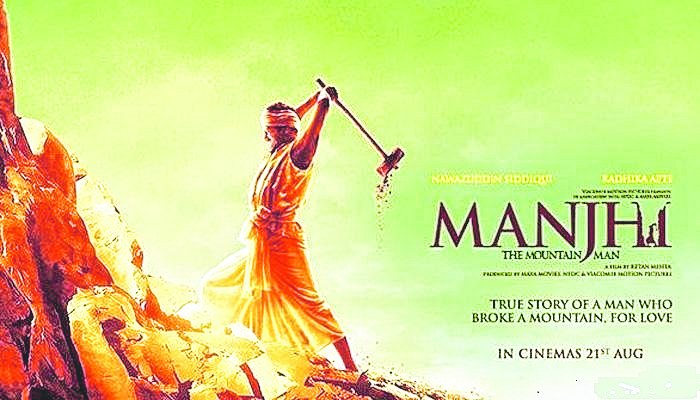
Manjhi: The Mountain Man, a biopic on Mountain Man Dashrath Manjhi, who literally moved a mountain to make way for a path, is ready for screening.
The film, directed by Ketan Mehta, will release in theatres on August 21. The state government has already declared the film tax-free in the state.
Before the film's release, a team from the film's unit, including Ketan Mehta, will visit Gehlaur in Gaya - around 35km northeast of the district headquarters and 120km south of Patna, where Dashrath lived and a major portion of the biopic on his life was shot - to promote the film.
They will be there on August 17, Dashrath Manjhi's death anniversary.
Nawazuddin Siddiqui, who has played Dashrath in the film, and Varadraj Swami, the film's writer, researcher, dialogue-writer and associate director, will be in Gehlaur to promote the film.
Radhika Apte, who played Dashrath's wife in the movie, is likely to miss the programme because of a busy schedule, sources in Mumbai said. Manjhi: The Mountain Man is a low-budget film costing around Rs 8 crore. Around 85 per cent of the film was shot in Gehlaur.
Varadraj, who hails from Chatra district in neighbouring Jharkhand, said the visiting team would offer some financial help to Dashrath's family members and donate funds for repair and development of a school started by an NGO, Milap Foundation, in the village.
The same day the team would inaugurate a gate built in memory of the mountain man and organise a function to remember him.
Dashrath carved out a 25 feet high, 30 feet wide and 305 feet long road, chipping away alone with just a chisel and hammer for 22 long years.
He undertook the Herculean task because his wife Faguni Devi sustained grievous injuries while crossing a narrow passage between the hills in the course of bringing water for him.
Deprived of timely medical attention, she later died.
After Manjhi carved out the road between the hills, the distance from Gehlaur to Wazirganj - otherwise just across the hillock - reduced by over 55km to around 9 km.
Earlier, one had to cover 65km by road to reach Gehlaur via Atri and Jethian, bordering Rajgir.
The road carved by Dashrath also connects with Grand Trunk road via Fatehpur and Barachatti.
Ashok Anj, a social activist from Wazirganj, said, for his historic deed, Dashrath made it to the Limca Book of World Records in 1991.
A chapter on his life, Pahad Se Uncha Aadmi, has been included in NCERT's Class VII curriculum.
Dashrath's family members are happy about that his real dogged pursuit will come to light for all to see in a film.
His son Bhagirath, in his sixties now, said: "We are very happy that a film has been made on the life of my father."
But he also regretted that people from outside come to cash in on his legendary father's popularity. "But our family lives in poverty. Such people should do something for the family," he said.










